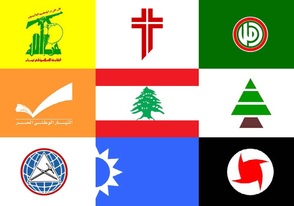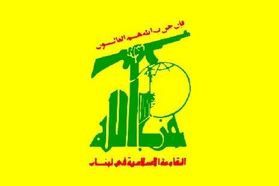
Lebanon has numerous political parties, which were mostly founded during periods of war and instability.
Since the assassination of Rafiq Hariri, the political scene in Lebanon has become very polarized and many parties now make up two rival party blocs, the pro-Syrian March 8 Coalition and anti-Syrian March 14 Alliance.
March 8 Coalition
The March 8 Coalition receives its name from the pro-Syrian demonstrations Hezbollah called for on 8 March 2005, following the assassination of Rafiq Hariri (for more information, click here). The following are the main parties that comprise it:
• Hezbollah - Pro-Syrian Shi’ite party headed by Sayed Hassan Nasrallah (see text box below).
• Amal Movement - Pro-Syrian Shi’ite party headed by Nabih Berri.
• Progressive Socialist Party (PSP) - Druze-dominated party headed by Walid Jumblatt, son of Kamal Jumblatt. Note: Initially part of the 14 March Alliance, the PSP moved to the March 8 Alliance in January 2011, yet with the onset of the Syrian civil war, it clearly showed their support for the Syrian opposition.
• Free Patriotic Movement (FPM) - Christian Maronite party headed by Michel Aoun. Note: In July 2013, Parliament Speaker Nabih Berri announced the collapse of the March 8 coalition, putting an end to the alliance with the Free Patriotic Movement.
March 14 Alliance
The March 14 Alliance is named after the anti-Syrian counter protests on 14 March 2005 and mainly consists of the following parties:
• Future Movement (FM) - Sunni-dominated party headed by Saad Hariri.
• Lebanese Forces (LF) - Maronite party headed by Samir Geagea.
• Kataeb Party (Lebanese Phalangist Party) - Maronite party headed by Amine Gemayel.
The March 8 Coalition receives its name from the pro-Syrian demonstrations Hezbollah called for on 8 March 2005, following the assassination of Rafiq Hariri (for more information, click here). The following are the main parties that comprise it:
• Hezbollah - Pro-Syrian Shi’ite party headed by Sayed Hassan Nasrallah (see text box below).
• Amal Movement - Pro-Syrian Shi’ite party headed by Nabih Berri.
• Progressive Socialist Party (PSP) - Druze-dominated party headed by Walid Jumblatt, son of Kamal Jumblatt. Note: Initially part of the 14 March Alliance, the PSP moved to the March 8 Alliance in January 2011, yet with the onset of the Syrian civil war, it clearly showed their support for the Syrian opposition.
• Free Patriotic Movement (FPM) - Christian Maronite party headed by Michel Aoun. Note: In July 2013, Parliament Speaker Nabih Berri announced the collapse of the March 8 coalition, putting an end to the alliance with the Free Patriotic Movement.
March 14 Alliance
The March 14 Alliance is named after the anti-Syrian counter protests on 14 March 2005 and mainly consists of the following parties:
• Future Movement (FM) - Sunni-dominated party headed by Saad Hariri.
• Lebanese Forces (LF) - Maronite party headed by Samir Geagea.
• Kataeb Party (Lebanese Phalangist Party) - Maronite party headed by Amine Gemayel.
HEZBOLLAH (THE PARTY OF GOD)
Hezbollah, literally ‘the party of God’, is a predominantly Shi’ite Islamist party and officially founded in 1985 as a force against the Israeli occupation of Lebanon. The party’s ideological origins stem from the 1979 Iranian Revolution, which overthrew the Western oriented shah and led to the establishment of the Islamic Republic of Iran. At that time, the Shi’ites of the south of Lebanon had already suffered the brunt of the cross-border conflict between Israel and the Palestinians. The final catalyst for the creation of the party as “the Islamic Resistance” was Israel’s invasion in Lebanon in 1982. Eventually, Hezbollah also took part in the Civil War, fighting against Palestinians, the Lebanese Forces, as well as its rival Shi’ite movement Amal. During this period, the party also became associated with kidnappings of Western nationals residing in Lebanon. Following the Civil War, Hezbollah focused its military on fighting the Israelis through guerilla operations as well as rocket attacks into Israel. Besides its resistance operations, Hezbollah is known for its social services, such as financing schools, hospitals and agricultural projects in the Beqaa Valley, the southern suburbs of Beirut and the south of Lebanon. Politically, Hezbollah positions itself as a major player within the March 8 coalition, opposing Hariri’s Future Movement and its allies. In May 2008, this opposition resulted in a military clash, during which Hezbollah took over parts of Ras Beirut for several days.
Hezbollah, literally ‘the party of God’, is a predominantly Shi’ite Islamist party and officially founded in 1985 as a force against the Israeli occupation of Lebanon. The party’s ideological origins stem from the 1979 Iranian Revolution, which overthrew the Western oriented shah and led to the establishment of the Islamic Republic of Iran. At that time, the Shi’ites of the south of Lebanon had already suffered the brunt of the cross-border conflict between Israel and the Palestinians. The final catalyst for the creation of the party as “the Islamic Resistance” was Israel’s invasion in Lebanon in 1982. Eventually, Hezbollah also took part in the Civil War, fighting against Palestinians, the Lebanese Forces, as well as its rival Shi’ite movement Amal. During this period, the party also became associated with kidnappings of Western nationals residing in Lebanon. Following the Civil War, Hezbollah focused its military on fighting the Israelis through guerilla operations as well as rocket attacks into Israel. Besides its resistance operations, Hezbollah is known for its social services, such as financing schools, hospitals and agricultural projects in the Beqaa Valley, the southern suburbs of Beirut and the south of Lebanon. Politically, Hezbollah positions itself as a major player within the March 8 coalition, opposing Hariri’s Future Movement and its allies. In May 2008, this opposition resulted in a military clash, during which Hezbollah took over parts of Ras Beirut for several days.


